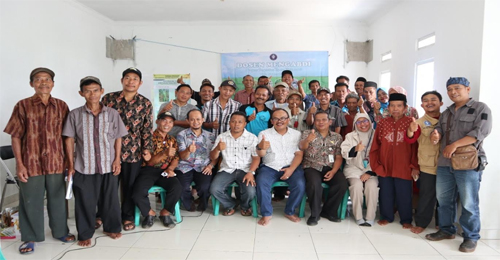LPPM IPB University Sends Lecturers and Alumni to Offer Agricultural Solutions in Petir Village

The Institute of Research and Community Service (LPPM) of IPB University conducted the Creative Agro Field Station (SLAK) program in Petir Village, Dramaga District, Bogor, West Java. This activity involved IPB University alumni as a facilitator and several lecturers to serve in this village for one month from 1 to 30 November 2019.
On this occasion the facilitator was tasked with accommodating all the aspirations of the community both regarding obstacles in the village, the potential of the village, and when IPB University came down to the village what was needed by the community.
Wildan Sujali, Acting Head of Petir Village, said that the majority of the people earn a living as farmers. Some of the problems faced by people in the village of Petir are the unsatisfactory yields of corn and sweet potatoes due to pest attacks.
“The harvest is directly sold cheaply without any processed products, then another problem is the amount of garbage that has accumulated due to the unavailability of adequate landfills and the lack of public awareness in managing waste,” he said.
Meanwhile, the results of interviews conducted by the facilitator with several farming communities, obtained information that farmers find it difficult to get water for irrigation to cultivated land. In addition, they conveyed the number of pests that attack plants and it is difficult to control these pests. They also hoped that the presence of IPB University to the village could provide input and solutions to the problems they faced.
On November 21, 2019, the LPPM IPB University team together with lecturers who served in Petir Village held a meeting with residents to discuss the problems faced and find solutions to those problems.
The lecturer who had the opportunity to attend this time was Dr. Irmansyah from the Department of Physics of IPB University, who delivered the material and provided education on how to save money in using electricity.
Meanwhile, two lecturers from the Department of Plant Protection, Faculty of Agriculture, IPB University, Dr. Dewi Sartiami and Dr. Rully Anwar delivered material on new pests in maize namely the corn grayak caterpillar (Spodoptera frugiperda). This pest is an important pest in corn because of damage caused to plants, even in severe attacks the plant cannot produce due to attacks on the growing point of corn.
“This pest has the characteristics of a line like the letter” Y “on the head, while on the tail there are four black dots that form a square,” said Dewi.
One of the control efforts that can be carried out on these pests is entomopathogenic fungus. This entomopathogenic fungus has been prepared from the Dramaga campus of IPB so that people can use it in the field. “The fungus used is Metarizhium rileyi which can be bred on corn and rice media,” Rully explained.
The last session of this discussion discussed the sustainability of the activities to be carried out. The community hopes that with this SLAK activity can provide solutions so that in the future the welfare of the community can be even better. (AANL / RA)
Keyword: IPB lecturer, SLAK IPB, new pest of corn, entomopathogenic fungus



